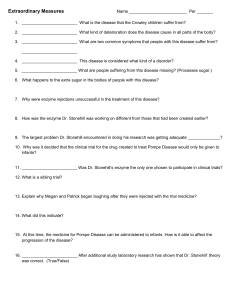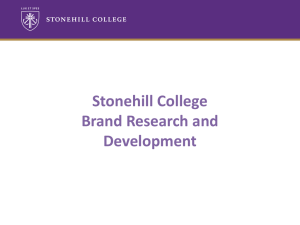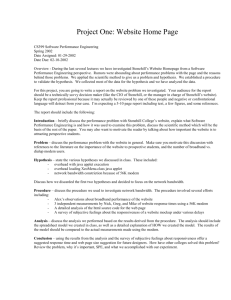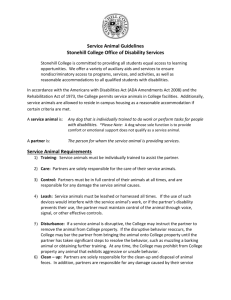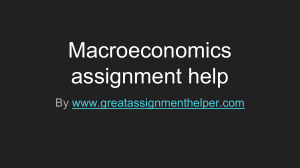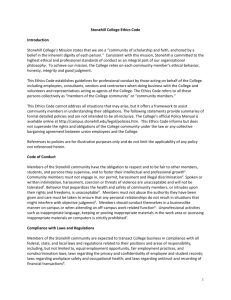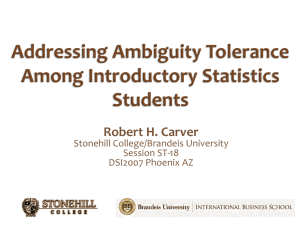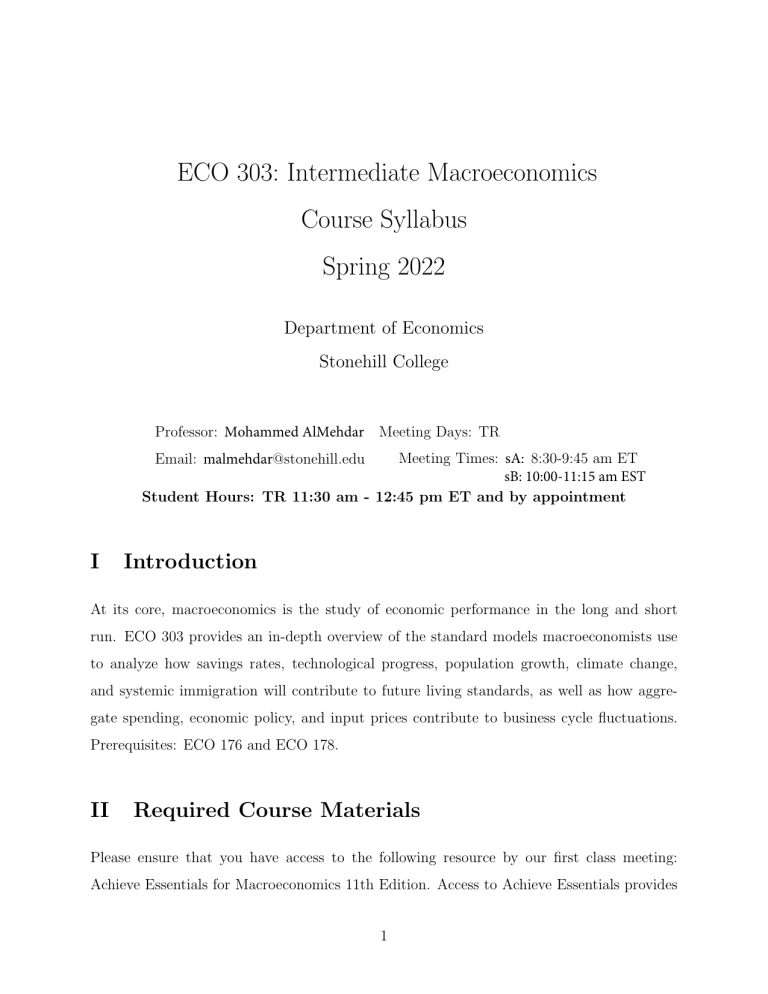
ECO 303: Intermediate Macroeconomics Course Syllabus Spring 2022 Department of Economics Stonehill College Professor: Mohammed AlMehdar Meeting Days: TR Meeting Times: sA: 8:30-9:45 am ET sB: 10:00-11:15 am EST Student Hours: TR 11:30 am - 12:45 pm ET and by appointment Email: malmehdar@stonehill.edu I Introduction At its core, macroeconomics is the study of economic performance in the long and short run. ECO 303 provides an in-depth overview of the standard models macroeconomists use to analyze how savings rates, technological progress, population growth, climate change, and systemic immigration will contribute to future living standards, as well as how aggregate spending, economic policy, and input prices contribute to business cycle fluctuations. Prerequisites: ECO 176 and ECO 178. II Required Course Materials Please ensure that you have access to the following resource by our first class meeting: Achieve Essentials for Macroeconomics 11th Edition. Access to Achieve Essentials provides 1 an electronic copy of the course textbook and your online homework assignments. It also has other features, such as adaptive practice tests, that are important study aids. You must purchase access to Achieve Essentials to complete this course. III Grading Policy I will base your letter grades on your numeric scores according to the following table: A A− B+ B B− C+ C C− D+ D F 93-100 90-92 87-89 84-86 80-83 77-79 74-76 70-73 65-69 60-64 0-59 I will calculate your course grade using the following weighting scheme: Achieve Assessments 20% Group Presentation 10% Midterm 25% Final Exam 35% Class Participation 10% The following sections provide expectations and policies for each category. IV Achieve Assessments Achieve Essentials is an online platform that provides you with an eBook version of Macroeconomics 11th Edition, adaptive learning exercises, and procedurally generated assignments. You must complete Achieve Assessments (End of Chapter Problems) related to the textbook material we cover in class. Expect to complete one to two chapters worth of assignments roughly every week. I will announce due dates by email and eLearn announcements. Achieve Assessment questions come in a variety of forms: multiple choice, shifting graphs and identifying equilibrium points, numerical answers, etc. You have three attempts at each question, after which you will receive no credit for that question. Do not blow through your attempts: A wrong answer reduces your maximum score for a particular question by 2 25%. Please take your time, read questions carefully, and complete them with care. V Exams You must complete two take-home timed exams with different weights. These weights reflect the fact that each exam is cumulative and will cover a growing body of material. Please mark these exam dates in your calendar ASAP: 3 Midterm March 15th-21st Final Exam TBD The final exam date has yet to be set, but I will inform the class and update the syllabus as soon as the Registrar provides the final exam schedule. Completing exams is a crucial part of your grade. VI Class Participation Participation in class discussions is an important part of the learning process. To achieve a full participation grade, please aim to contribute at least twice every session. One of the main aims of the course is to facilitate transference of the theoretical knowledge learned from the material to real world applications. I therefore encourage everyone to contribute to the discussions in class in order to explore how the concepts can be applied to their experiences and interests. 4 You have three free absences, and you do not need to notify me ahead of time, nor provide documentation, when you use one of your allotted absences. If you are marked absent four or more times, you will receive a zero class participation grade. Use your absences wisely. Achieve Learning Curve is an adaptive assessment that tracks your progress in the course. Learning Curve requires you to accumulate a certain number of points by answering questions correctly to complete the assignment. There is no penalty for wrong answers, and you are awarded full credit once you earn the required number of points. These assignments are included in your homework grade. You must complete 70 percent of all Learning Curve assignments, otherwise you will receive a zero class participation grade. VII Student Hours, Communication, and Zoom I will strive to provide ample appointment times in my calendar to book office hours. Please feel free to communicate freely with me about any issues you have. Please also feel free to reach out to me via email. I only respond to emails during normal business hours on non-holiday weekdays. To save you time and as a courtesy to me, You should also consistently check your Stonehill email account and eLearn 5 announcements for correspondence from me. I will use these platforms to post assignment due date and exam date reminders, exam procedures, and other important information. I may also reach out to you directly if I am concerned about your course performance. All classes are designated as live-stream classes. 6 IX Course Topics (note: dates are preliminary) 1. Introduction Chapter 1: The Science of Macroeconomics Chapter 2: The Data of Macroeconomics 2. Overview of the Modern Economy Chapter 3: The Distribution of National Income Chapter 4: The Monetary System (Feb 15) Chapter 5: Inflation and its Causes (Feb 17) Chapter 6: The Open Economy (Feb 22) Chapter 7: Unemployment and Labor Markets (Feb 24) 3. Economics of the Long Run Chapter 8: Capital Accumulation and Living Standards (March 1) Chapter 9: Population Growth, Technological Progress, and Living Standards (March 3) 4. Economics of the Short Run Chapter 11: The U.S. Business Cycle (March 8) Chapter 12: Aggregate Demand (March 10) Midterm Review (March 15) Chapter 13: Aggregate Demand (March 17) Chapter 14: The Open Economy (March 22/24) Chapter 15: Aggregate Supply (March 29) Chapter 16: The Dynamic AS/AD Model (March 31) 7 Chapter 17: Perspectives on Monetary Policy (April 5) X Academic Integrity My expectation is that you will adhere to the Stonehill Academic Honor Code and Academic Integrity Policy found in the Hillbook under Academic Policies and Procedures. I encourage you all to work together on Achieve Assessments and Learning Curve assignments. Please keep in mind that these questions are procedurally generated, so you and your peers will be prompted with different questions. This means that you must complete your own individual Achieve assignments, and you cannot claim another person’s submission as your own because you worked together. Please keep in mind that lying is also a serious academic integrity violation. If you lie about your COVID-19 status, health status, NCAA team travel schedule, etc. to be excused from an exam or other class obligations, you will fail the course. You will also fail the course if you lie on behalf of others. Be aware that my lecture slides contain copyrighted material from various textbooks and other sources. I will post them online so you can refer to them at any time, but do not re-post my slides on the internet. Only students who are enrolled in this course may access this content and you may not share or distribute it in any way. Doing so is a violation of copyright law, and publishers may pursue legal action against you. Moreover, I own the intellectual property rights to the course content that I develop. Students may not record any part of class meetings without my explicit permission and the consent of all participating 8 students. Students that receive permission to record class meetings may not share their recordings with others and must delete them when the final exam period concludes. XI Classroom Accommodations Stonehill College is committed to providing a welcoming, supportive and inclusive environment for students with disabilities. The Office of Accessibility Resources (OAR) provides a point of coordination, resources and support for students with disabilities and the campus community. If you anticipate or experience physical or academic barriers based on disability, please let me know so that we can discuss options. You are also welcome to contact OAR to begin this conversation or to establish reasonable accommodations for this or other courses. OAR is located within the Academic Services & Advising Suite in Duffy 104. For additional information please call (508) 565-1306 or email accessibility-resources@stonehill.edu. XII Diversity and Inclusion Stonehill College embraces the diversity of students, faculty, and staff, honors the inherent dignity of each individual, and welcomes their unique cultural and religious experiences, beliefs, and perspectives. We all benefit from a diverse living and learning environment, and the sharing of differences in ideas, experiences, and beliefs help us shape our own perspectives. Course content and campus discussions will heighten your awareness to these differences. There are many resources for anyone seeking support or with questions about diversity and inclusion at Stonehill. Resources are infused throughout the Mission Division, Academic Affairs, and Student Affairs. If you’d like more information on how to get connected to resources, the Office of Intercultural Affairs is a good first stop: Location: Duffy 149, Phone: 508-565-1409, Email: diversity@stonehill.edu. If you are a witness to or experience an act of bias at Stonehill, you may submit a bias incident report online or on the Stonehill App. If you would like to learn more on bias incident prevention and response, or submit a report please click here. 9 A personal note from your professor. . . I consider Stonehill College’s commitment to honoring the inherent dignity of each individual as the school’s prime directive. While the College and I encourage you all to respect a diverse set of views, certain views run contrary to our founding principles by implicitly or explicitly calling for harm against Stonehill community members. In this spirit, I will intervene if students behave in such a manner or make statements that run contrary to the belief in the inherent dignity of each individual. If I must intervene because of your comments twice during the semester, you will fail the course. Additionally, please contact me directly if you ever have a concern about my behavior or that of another student in the class. I will commit to do whatever it takes to create an inclusive remote classroom environment. Thank you! XIII Resources for Academic Support The Center for Writing and Academic Achievement (CWAA) provides academic support services in a welcoming, professional environment that emphasizes collaborative learning and peer tutoring, supplemented with professional-level support. The CWAA offers a variety of academic support services, including peer tutoring in writing, math, and foreign languages. The CWAA is located in MacPháidı́n Library, Room 314. Drop-in hours are offered Sunday through Thursday. Students can visit the CWAA website to view schedules, make appointments, or request a tutor. XIV Resources for Mental Health and Well-being Your mental health and well-being is very important! We all experience emotional distress and personal difficulties as a normal part of life. Sometimes, these struggles can interfere with our day-to-day functioning. As your professor, I want to support your well-being and success and encourage you to reach out if you are having difficulty with this course. However, as I am not qualified to serve as your counselor, I want to share resources available should you experience mental health distress and/or personal difficulties. Stonehill College Counselling Services offers free and confidential mental health services that are not connected to your 10 academic record in any way. For more information, please visit the Counseling Services website here. Counseling Services, located in the Chapel of Mary building, is open Monday to Friday from 8:30 am to 4:30 pm. Please call (508) 565-1331 or stop by the front desk to schedule an intake appointment or to inquire about “urgent” appointment availability. Additional resources: Emergency numbers: Call SCPD at (508) 565-5555 if on campus or 911 if off campus. 24/7 National Suicide Prevention Lifeline: 1-800-237-8255 24/7 Crisis Text Line: Test “Start” to 741-741 A web resource on college mental health, including online screening. 11
